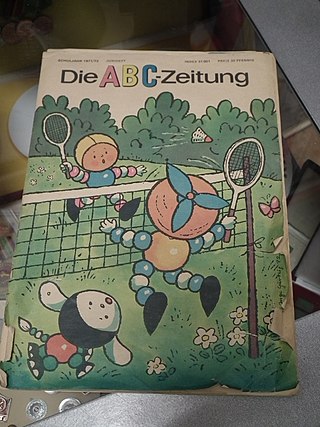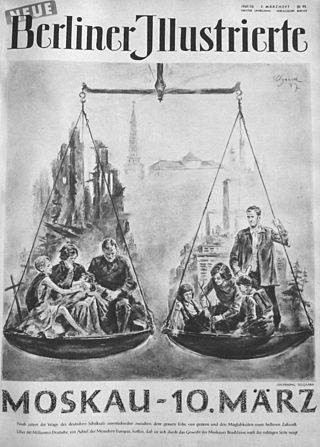
East Germany, officially known as the German Democratic Republic, was a country in Central Europe from its formation on 7 October 1949 until its reunification with West Germany on 3 October 1990. Until 1989, it was generally viewed as a communist state and described itself as a socialist "workers' and peasants' state". The economy of the country was centrally planned and state-owned. Although the GDR had to pay substantial war reparations to the Soviets, it became the most successful economy in the Eastern Bloc.

The Communist Party of Germany is a Marxist-Leninist communist party in Germany. It is one of several parties which claim the KPD name and/or legacy. It was founded in Berlin in 1990. The party is also commonly referred to by the name KPD-Ost to differentiate it from other parties with the same name, most prominently the historical Communist Party of Germany.

Bunte is a German-language weekly celebrity gossip magazine published by Hubert Burda Media. The first edition was published in 1948 under the name Das Ufer. Under the leadership of Hubert Burda, Bunte developed into a modern popular magazine. In 2014, Bunte was the 11th most popular media brand in Germany, with 10.57 million monthly users. After Patricia Riekel stepped down, Robert Pölzer took over as Editor-in-Chief in July 2016.
Neues Deutschland is a left-wing German daily newspaper, headquartered in Berlin.

Hubert Burda Media Holding is a German media group with headquarters in Offenburg. It originated as a small printing business, founded by Franz Burda Snr in Philippsburg, in 1903.

PACO was the name of the official Mondpaca Esperantista Movado (MEM) magazine.

ABC-Zeitung was a German monthly children's magazine published between 1946 and 1996.

The Leipziger Volkszeitung or LVZ is a daily regional newspaper in Leipzig and western Saxony, Germany. First published on 1 October 1894, the LVZ was formerly an important publication of the workers' movement and is currently the only local newspaper in Leipzig.
Theater der Zeit is a German-language monthly magazine that focuses on theatre and politics. It was established in 1946 and is now—alongside Theater heute—one of the leading magazines on theatre in the German-speaking world. In 1996, the Theater der Zeit publishing house began to publish books.
Manager Magazin is a German monthly business magazine focusing on business, finance and management based in Hamburg.
Det fri Aktuelt was a daily newspaper published in Copenhagen, Denmark, between 1871 and 2001. It was the first socialist and the earliest newspaper published by a labor union in the world. In addition, it was the last major social democrat newspaper in Denmark.
Bo Bedre is a monthly lifestyle and interior design magazine published in Frederiksberg, Copenhagen, Denmark. It is the first interior design magazine in the country. The magazine has Norwegian and Finnish editions.
Lausitzer Rundschau is a daily regional newspaper published in Cottbus, Brandenburg, Germany. It has been in circulation since 1946.

ADAC Motorwelt is an automobile and travel magazine published in Munich, Germany. It is a member-magazine of ADAC and due to 21,4 millions ADAC-members it was over decades one of the magazines in Germany with the highest circulation.
Freundin is a fortnightly women's magazine published in Munich. Launched in 1948, it is one of the earliest magazines in its category.

Freizeit Revue is a German language weekly entertainment and women's magazine published in Offenburg, Germany. It has been in circulation since 1970.
Focus Money is a business magazine published in Munich, Germany. It is one of the spin-offs of the German news magazine Focus and has been in circulation since 2000.
Melodie und Rhythmus was a German countercultural magazine founded in East Berlin in November 1957 as a music magazine. The magazine initially focused on dance and easy listening music in the German Democratic Republic, and slowly expanded its content to pop and rock until its discontinuance in 1991. Between 2004 and 2022, Melodie und Rhythmus adopted a similar approach but it gradually shifted towards socio-political issues.
Sibylle was a bimonthly fashion magazine that was published in East Germany and then in Germany from 1956 to 1995. The magazine was subtitled Zeitschrift für Mode und Kultur. It is known as the most famous fashion magazine of East Germany and was called Vogue of East Germany.

Neue Berliner Illustrierte was a weekly illustrated magazine which existed between 1945 and 1991. It was published in East Germany and then in Germany following the German reunification. Its title was a reference to Berliner Illustrirte Zeitung which was an influential German publication at the beginning of the 20th century.









